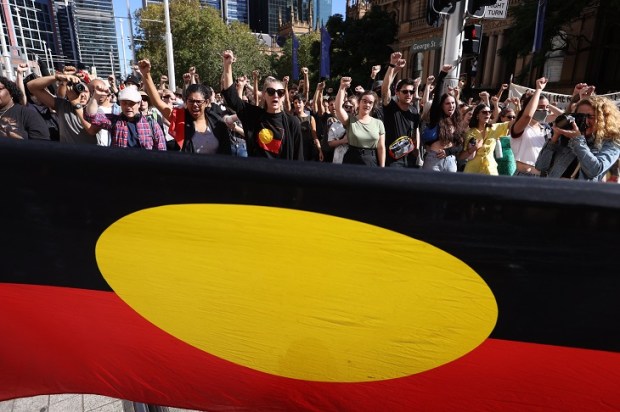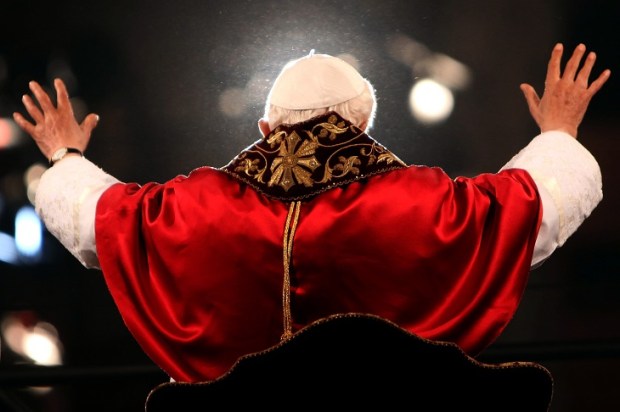I’m just going to come out and say what we’re all thinking – the Voice to Parliament is state-sanctioned racism.
What Anthony Albanese is seeking to do, no matter how well-intentioned, is not going to lead to ‘reconciliation’ or the betterment of disadvantaged Indigenous communities. Instead, the whole thing is likely to backfire horribly, leaving one race of individuals with arbitrary powers above those of other Australians.
The Prime Minister’s proposed referendum is the ultimate virtue signal. His actions thus far prove as much. He has been on a whirlwind marketing campaign – speaking at the Garma Festival, jumping at photo-ops, parading around as a ‘saviour figure’ – all the typical Labor window-dressing.
But then Albanese decided to say:
‘All Australians have the chance to own this change, and be counted on the right side of history.’
To declare a ‘right’ and ‘wrong’ side of history is an interesting piece of hubris. He is telling Australians that if they vote ‘no’ on his referendum, they are on the wrong side of history.
In reality, if you vote ‘no,’ it means you possess the increasingly rare ability to think for yourself, which in turn means you understand the ramifications of passing this referendum.
It is difficult to imagine a situation that would make enshrining racism into the Australian Constitution the ‘right’ side of history.
The question being posed for the referendum on an Indigenous Voice to Parliament reads as follows:
Do you support an alteration to the Constitution that establishes an Aboriginal and Torres Strait Islander Voice? If the referendum is successful, the government is proposing adding the following three sentences to the constitution:
-
There shall be a body, to be called the Aboriginal and Torres Strait Islander Voice.
-
The Aboriginal and Torres Strait Islander Voice may make representations to Parliament and the Executive Government on matters relating to Aboriginal and Torres Strait Islander Peoples.
-
The Parliament shall, subject to this Constitution, have power to make laws with respect to the composition functions, powers, and procedures of the Aboriginal and Torres Strait Islander Voice.
Essentially, this would give certain individuals – chosen in a way not yet known but we may assume it involves their race – powers not yet known to speak on behalf of all Indigenous Australians. The Parliament would assume that whatever the ‘Aboriginal and Torres Strait Islander Voice’ wants is representative of what all Aboriginal and Torres Strait Islander people want.
There is a significant concern that this ‘Voice’ would end up crumbling to corruption as other similar projects have done. It is all too easy for several Indigenous inner-city activists to end up forming the core of this ‘Voice’ and then using it to pursue agendas that look good in print while leaving everyday Indigenous Australians voiceless in the dust.
I think our newest Indigenous member of Parliament, Senator Jacinta Nampijinpa Price, in responding to an article discussing Marcia Langton’s views on the Voice to Parliament, put it best:
‘The Voice is being led by members of the Indigenous elite who’ve spent their lives on the gravy train built on the backs of the misery of the most marginalised and changed nothing for them. The Voice to Parliament is the gravy train attempting to ingrain itself into the constitution so despite its failures and lack of accountability, it can never be dismissed.
‘I think it’s Labor who are confused about the detail of the Voice or whether it will be defined before or after a referendum. It’s as clear as mud and the most marginalised Indigenous Australians in remote communities haven’t a clue as to what it is or how it’s supposed to support them.’
Jacinta is dead right. Albanese’s proposal is not going to benefit the Indigenous community, it is going to benefit a small panel of activists who will no longer need to win social arguments on merit in the public forum, but can instead push through bad ideas via a race-based loophole. Likely to be included is the unpopular notion of reparations of unknown value.
We have no idea about the extent of the problem because Labor cannot explain, even broadly, what this Voice will entail or how much power and influence the Voice will have.
When asked whether there would be more detail about what powers the Voice to Parliament would have before a referendum were held, the Prime Minister said the following:
‘I’m not going to go down the cul-de-sac of getting into every detail, because that’s not a recipe for success.’
It is worrying that Albanese is unwilling to reveal any more details prior to the referendum. His position suggests one of two things: either he has no idea what this will all involve, or he knows full well what it will entail and does not want to reveal the detail because he knows it will cause an uproar and hinder his hopes of a successful referendum.
And so I have three points I would like to make on this Voice to Parliament.
First and foremost, we already have several Indigenous MPs. These represent the true Indigenous Voice in Parliament that the government should be listening to. Among these voices is Jacinta Nampijinpa Price. During the first sitting week of the 47th Parliament, she delivered a fantastic maiden speech highlighting the real issues facing Indigenous Australians and their communities.
Price has obviously taken on the role as Senator to make a real difference to the lives of Indigenous Australians. She is not there to virtue signal, perpetuate victimhood, or use Indigenous Australians as political pawns to forward her agenda. That is what sets her apart.
If Anthony Albanese wants an Indigenous Voice to Parliament, he already has it.
Strange that he chooses not to listen. Instead, he has criticised this Indigenous voice, saying that Senator Price’s comments on his Voice to Parliament don’t ‘stack up’. Perhaps what the Prime Minister actually wants is an Indigenous voice that aligns with his ideology.
Second, Albanese and Labor are making claims that the referendum is about Australians coming together. But this referendum is not going to unify. It will divide. Right now, all Australians, regardless of race, gender, sexuality, and ethnicity have the same voice to Parliament. This referendum will create a race-based supremacy whereby one ethnic group will be granted a special status enshrined in the Constitution above all others.
The irony of it all is that those who are calling others ‘racist’ are planning to vote in favour of enshrining racism in the Constitution.
My final point is more of a suggestion that I think would work far better than what the Prime Minister is attempting to do. And it would have a far greater positive impact on the country.
I address this to all Australians, but especially to Prime Minister Anthony Albanese:
Instead of holding a referendum to enshrine a Voice for one particular group, hold one to enshrine the voices of all Australians. Hold a referendum that will enshrine free speech into the Australian Constitution so that everyone’s voice is protected.
If we do this, the voices of all Australians will be equal forever.
We can still work together to address the issues facing Indigenous Australians and their communities. To that end, we should work closely with Senator Price who has decades of experience within these communities.
If you want to be on the right side of history, this is the way to do it.
Joel Agius is an independent writer. If you would like to read more of his work, you can do so at JJ’s Outlook or keep up to date with his musings on Twitter.

























